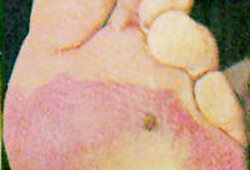Resumo
Definição
História e exame físico
Principais fatores diagnósticos
- presença de fatores de risco
- sensação de frio ou dormência do membro afetado
- dor durante reaquecimento
- descoloração púrpura da pele
- descoloração cutânea branca ou amarelada, e cérea
- vesiculação da pele superficial
- bolhas profundas de cor púrpura
- necrose e mumificação do tecido (gangrena seca)
Outros fatores diagnósticos
- eritema
- luxação articular
- fraturas
Fatores de risco
- exposição ao frio
- congelamento prévio das extremidades
- insuficiência vascular
- altitudes elevadas
- hipóxia
- bebidas alcoólicas
- tabagismo
- desidratação
- trauma nos membros
- vestuário ou equipamento constritivo
Investigações diagnósticas
Primeiras investigações a serem solicitadas
- diagnóstico clínico
Investigações a serem consideradas
- cintilografia de pertecnetato de tecnécio-99m
- angiografia por ressonância magnética do membro afetado
- radiografia simples
Novos exames
- termografia e imagem duplex
Algoritmo de tratamento
todos os pacientes
Colaboradores
Autores
Elizabeth A. Kaufman, MD, CAQ-SM
Attending Physician
Department of Orthopedics, Sports Medicine
Scripps Clinic
Attending Physician
Rady Children’s Hospital San Diego
Department of Orthopedics, Sports Medicine
San Diego
CA
Declarações
EAK declares that she has no competing interests.
Christopher Imray, PhD, FRCS, FRCP, FRGS
Consultant Vascular and Renal Transplant Surgeon
University Hospital Coventry and Warwickshire NHS Trust
Professor Coventry University, Warwick Medical School, Exeter University
Coventry
UK
Declarações
CI has been asked to provide expert testimony on frostbite. He has delivered lectures, and produced educational material on frostbite.
Agradecimentos
Professor Christopher Imray and Dr Elizabeth A. Kaufman would like to gratefully acknowledge Professor Paul S. Auerbach and Dr Claire Turchi, previous contributors to this topic. PSA and CT declare that they have no competing interests.
Revisores
Luanne Freer, MD, FACEP, FAWM
Medical Director
Yellowstone National Park
WY
Founder/Director
Everest Base Camp Medical Clinic
Nepal
Declarações
LF declares that she has no competing interests.
Grant S. Lipman, MD
Clinical Assistant Professor of Surgery and Emergency Medicine
Associate Director Wilderness Medicine Fellowship
Assistant Research Director
Stanford University School of Medicine
Palo Alto
CA
Declarações
GSL declares that he has no competing interests.
Peter Hackett, MD
Director
Institute for Altitude Medicine
Telluride
CO
Declarações
PH declares that he has no competing interests.
Créditos aos pareceristas
Os tópicos do BMJ Best Practice são constantemente atualizados, seguindo os desenvolvimentos das evidências e das diretrizes. Os pareceristas aqui listados revisaram o conteúdo pelo menos uma vez durante a história do tópico.
Declarações
As afiliações e declarações dos pareceristas referem--se ao momento da revisão.
Referências
Principais artigos
McIntosh SE, Freer L, Grissom CK, et al. Wilderness Medical Society clinical practice guidelines for the prevention and treatment of frostbite: 2024 update. Wilderness Environ Med. 2024 Jun;35(2):183-97.Texto completo Resumo
Sheridan RL, Goverman JM, Walker TG. Diagnosis and treatment of frostbite. N Engl J Med. 2022 Jun 9;386(23):2213-20.
Rabold MB. Frostbite and other localized cold-related injuries. In: Tintinalli JE, Kelen GD, Stapczynski JS, et al. Tintinalli's emergency medicine: a comprehensive study guide. 6th ed. New York, NY: McGraw-Hill; 2004.
Roche-Nagle G, Murphy D, Collins A, et al. Frostbite: management options. Eur J Emerg Med. 2008 Jun;15(3):173-5. Resumo
Artigos de referência
Uma lista completa das fontes referenciadas neste tópico está disponível para os usuários com acesso total ao BMJ Best Practice.

Diagnósticos diferenciais
- Queimaduras cutâneas
- Geladura superficial
- Fenômeno de Raynaud
Mais Diagnósticos diferenciaisDiretrizes
- 2024 American Heart Association and AmericanRed Cross Guidelines for First Aid
- Clinical practice guidelines for the prevention and treatment of frostbite: 2024 update
Mais DiretrizesConectar-se ou assinar para acessar todo o BMJ Best Practice
O uso deste conteúdo está sujeito ao nosso aviso legal